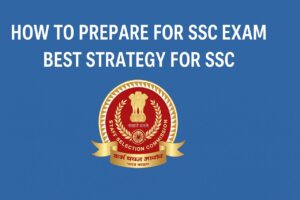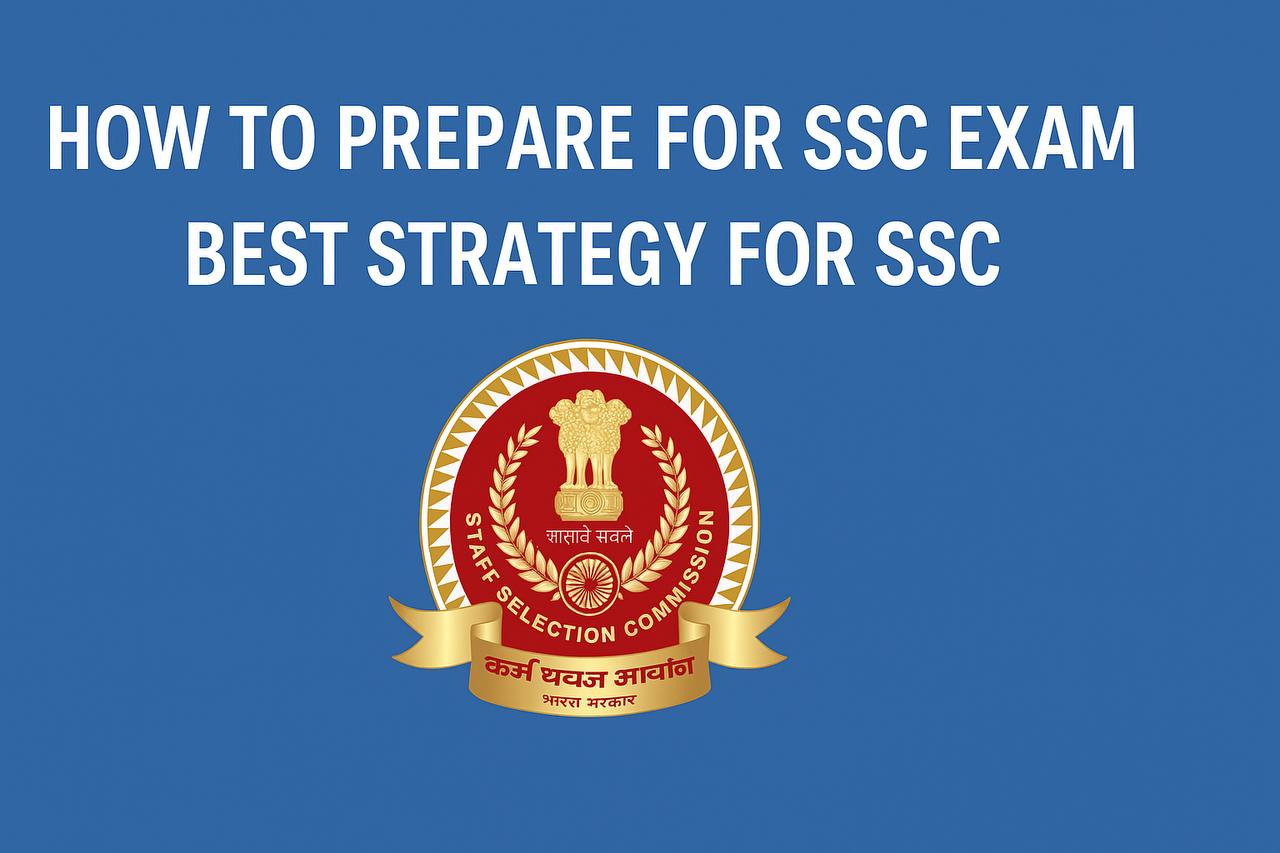How to prepare for SSC exam – Best strategy for SSC exam
How to prepare for SSC exam – Best strategy for SSC exam

🏗️ Phase 1: Foundation (Weeks 1–6)
1. Syllabus & Exam Pattern Mastery
-
Download the official syllabus PDF for your specific SSC paper.
-
Break it down into sections:
-
Quantitative Aptitude
-
Reasoning & General Intelligence
-
English Language & Comprehension
-
General Awareness (plus Computer Knowledge, if applicable)
-
2. Build Core Concepts
| Section | Focus Areas | Resources |
|---|---|---|
| Math | Number Systems, Percentages, Ratio & Proportion, Algebra, Geometry, Data Interpretation | R.S. Aggarwal; Arun Sharma (Quant) |
| Reasoning | Verbal (Series, Analogy, Coding-Decoding), Non-Verbal (Puzzles, Mirror/Water Images) | R.S. Aggarwal; Kiran Practice Reasoning |
| English | Grammar (Error Spotting, Fill-in-Blanks), Vocabulary (Antonyms, Synonyms), Reading Comprehension | Wren & Martin; Plinth to Paramount |
| General Awareness | Static GK (History, Geography, Polity), Current Affairs (last 6–12 months) | Lucent’s GK; monthly CA capsules |
| Computer (if needed) | Basics of Hardware/Software, MS Office, Internet, Cybersecurity | Lucent’s Computer Knowledge |
-
Daily target: 1–2 chapters per subject; make concise notes or flashcards for formulas, rules, and GK facts.
🏃 Phase 2: Practice & PYQs (Weeks 7–12)
1. Section-Wise Question Drills
-
Quant: 50 questions/day from mixed topics; time yourself (1 Q ≈ 1 min).
-
Reasoning: 30–40 puzzles and verbal sets daily; focus on speed.
-
English: 20 grammar questions + 1 short passage comprehension.
-
GA: 30 static + 20 current affairs questions daily.
-
Computer: 20 questions/day (if in syllabus).
2. Analyze Past Year Papers
-
Solve last 5–8 years’ SSC papers strictly under exam conditions.
-
Maintain an Error Log: question, your answer, correct answer, key concept.
-
Identify patterns: high-frequency topics (e.g., Simplification in Quant, Seating Arrangement in Reasoning, Spotting Errors in English, Indian Polity in GA).
3. Build Speed & Accuracy
-
Aim for 90% accuracy—wrong answers cost negative marks.
-
Practice elimination techniques: learn to discard obviously wrong options in ≤ 5 seconds.
🥊 Phase 3: Mocks & Sectionals (Weeks 13–18)
1. Full-Length Mocks (2 per week)
-
Simulate exam day: full paper, official time limit, zero interruptions.
-
Review immediately: spend twice as much time analyzing your mistakes as you spent on the mock.
2. Sectional Timed Tests
-
Alternate days: one day Quant, next Reasoning, then English, GA.
-
Goal:
-
Quant: ≥ 50 Qs in 40 min
-
Reasoning: ≥ 50 Qs in 40 min
-
English: ≥ 35 Qs in 20 min
-
GA: ≥ 50 Qs in 20 min
-
3. Focused Revision
-
Flashcards for formulas, rules, vocabulary, GK facts.
-
Weekly recap of your Error Log—target “weak 10” questions.
⏳ Last Month Sprint (Final 4 Weeks)
-
Revision Only
-
No new topics.
-
Revise flashcards and one-page notes daily for all sections.
-
-
Daily Mock + Analysis
-
1 full mock each day or 2 sectionals (morning Quant/Reasoning, evening English/GA).
-
Limit analysis to 30–40 min: focus on recurring mistakes.
-
-
Time & Target Drills
-
Pick your weakest section each day for a 30 min “power drill.”
-
Work up to exam pace: e.g., Quant in 35 min, English in 18 min.
-
-
Mindset & Logistics
-
Sleep by 10 PM, light exercise, healthy diet.
-
Keep admit card, stationery, ID ready a week before.
-
Visualize success: 5 min meditation or positive visualization nightly.
-
🏆 Key Success Factors
-
Consistency: Small daily goals beat occasional marathon sessions.
-
Error-Driven Learning: Your mock mistakes are gold—mine them relentlessly.
-
Time Management: Practice under timed conditions from Day 1.
-
Smart Guessing: When in doubt, eliminate two options and take a calculated risk (if negative marking allows).
Stick to this roadmap, adapt it to your pace, and you’ll be in the top percentile on exam day. All the best!



